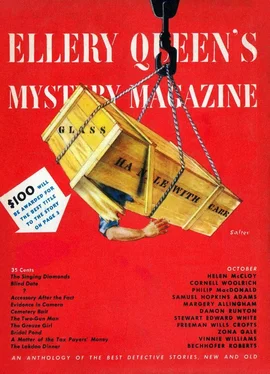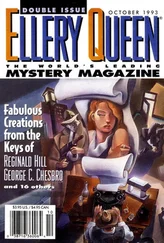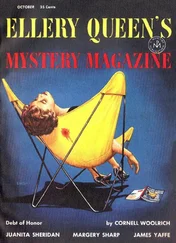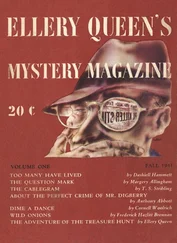Марджери Аллингем - Ellery Queen’s Mystery Magazine. Vol. 14, No. 71, October 1949
Здесь есть возможность читать онлайн «Марджери Аллингем - Ellery Queen’s Mystery Magazine. Vol. 14, No. 71, October 1949» весь текст электронной книги совершенно бесплатно (целиком полную версию без сокращений). В некоторых случаях можно слушать аудио, скачать через торрент в формате fb2 и присутствует краткое содержание. Город: New York, Год выпуска: 1949, Издательство: The American Mercury, Жанр: Классический детектив, на английском языке. Описание произведения, (предисловие) а так же отзывы посетителей доступны на портале библиотеки ЛибКат.
- Название:Ellery Queen’s Mystery Magazine. Vol. 14, No. 71, October 1949
- Автор:
- Издательство:The American Mercury
- Жанр:
- Год:1949
- Город:New York
- ISBN:нет данных
- Рейтинг книги:5 / 5. Голосов: 1
-
Избранное:Добавить в избранное
- Отзывы:
-
Ваша оценка:
- 100
- 1
- 2
- 3
- 4
- 5
Ellery Queen’s Mystery Magazine. Vol. 14, No. 71, October 1949: краткое содержание, описание и аннотация
Предлагаем к чтению аннотацию, описание, краткое содержание или предисловие (зависит от того, что написал сам автор книги «Ellery Queen’s Mystery Magazine. Vol. 14, No. 71, October 1949»). Если вы не нашли необходимую информацию о книге — напишите в комментариях, мы постараемся отыскать её.
Ellery Queen’s Mystery Magazine. Vol. 14, No. 71, October 1949 — читать онлайн бесплатно полную книгу (весь текст) целиком
Ниже представлен текст книги, разбитый по страницам. Система сохранения места последней прочитанной страницы, позволяет с удобством читать онлайн бесплатно книгу «Ellery Queen’s Mystery Magazine. Vol. 14, No. 71, October 1949», без необходимости каждый раз заново искать на чём Вы остановились. Поставьте закладку, и сможете в любой момент перейти на страницу, на которой закончили чтение.
Интервал:
Закладка:
She put on her steel-rimmed reading glasses and opened Mrs. Smith’s record. It was thick, dating back to 1932, the ERA days. Mango county had always been a poor county. The only people who hadn’t been on relief at one time or another were a few of the professional men and the big ranchers to the south.
Mrs. Smith’s first contact with the agency had been a note asking for commodities for herself and her twenty-five-year old son. The son had later been certified for WPA, but apparently was shiftless and a troublemaker.
Miss Minnie said, “Tch!” and read steadily through the rest of the record, finishing with the anonymous note.
It didn’t say much, just: “You folks ought to know, Mrs. Annie Smith of Possum Trot has herself a job at Jut’s jook joint,” but Miss Minnie found it absorbing. She reread it several times, then stared unseeingly out of her window at the little Gulf coast town lying clean and tropical in the sun.
Miss Minnie had changed her mind. The note made it necessary for her to visit Mrs. Smith that very afternoon.
She did not reach Possum Trot until after four o’clock. It had been a tough day. Unexpected problems like new babies, sickness, jobs, and leaks in roofs had cropped up. Then she had been delayed some time at Miley’s Crossroad Store by Sheriff Pete Cosey. The sheriff had insisted on telling her in detail his efforts at rounding up the person or gang responsible for three burglaries during the last month.
“I tell you I’ve covered this here county tail and mane, but I ain’t seen a person slick enough to pull off anything like them robberies. I tell you, Miss Minnie, it’s the work of some big-city gang. They got the tools and they’re slick!”
“I wouldn’t doubt it,” Miss Minnie had murmured, “but you’ll catch them, sheriff.”
Mrs. Annie Smith’s farm was on a sand trail winding off the Tamiami Trail through the piney woods, a weather-beaten clapboard house in an oak grove, the roof blanketed with flame vine. There was a turnip and yam patch to one side, a chicken yard to the other, and an outhouse screened with scarlet bougainvillea behind.
Miss Minnie nosed her shabby sedan to a stop under a chinaberry tree and got out, her dress sticking to her with sweat. Her short thick body ached in every joint from the jarring sand ruts, and her eyes smarted.
“Evening,” an old woman called from the porch. Faded blue eyes smiled from under the brim of a woven palmetto hat, bare brown feet peered from under an old gingham dress.
“Evening.” Miss Minnie forced her tired legs up the path to the porch. “Mrs. Smith? I’m Miss Minnie Boyd from the Welfare Office.”
The old woman’s smile faded. Her small thin body went still. “Why, I’m — I’m real pleased to meet you. Won’t you come in and set?”
“Thanks.” Miss Minnie followed her into the dim living room. How many parlors had she seen like this, the stone fireplace with the shotgun bracketed above, the deer horns, the ponderous family Bible, the stiff family portraits.
One thing was unusual. There were a dozen or more pictures of children cut from magazines tacked on the walls.
Miss Minnie smiled, “I see you’re partial to children.”
Mrs. Smith’s face lighted. “Yes’m, I purely love the lil’ boogers. The way I figger it, us old folks has made a sorry lob-lolly of the world, and I got them pictures tacked up to sort of remind me the Lord still loves this pore sinful race when he lets children go on being born.” She broke off abruptly. “Won’t you set, Ma’m?”
“Thanks.” Miss Minnie avoided a cushioned chair, took a straight one. Welfare workers are taught early to be leery of the small biting things which may lurk in upholstery. “It’s too bad you’re all alone, liking children that way.”
Mrs. Smith took off the palmetto hat and smoothed her white hair. She sat primly on the edge of a chair, feet tucked under her.
“Yes’m, it sure is. I–I reckon you all know, I had a boy. He had him a good job riding range, but he got in a cutting scrape and took off for Tampy. Died ten years back, may the Lord have mercy on him.”
Miss Minnie shook her head sadly, waited a second, and said, “Well, I don’t want to take up too much of your time, Mrs. Smith. I just dropped by to see how you were getting on.”
“Why, I’m toughing it out. I seen Miss Madge last month, and she went over my situation, groceries and kerosene and taxes and clothes and such like as that, and said she couldn’t give me no raise ’cause they hadn’t changed none.”
“That’s what I came to see you about. Mrs. Carlton thought you might have gotten in a tight. I’ll be real honest with you, Mrs. Smith. We got a note this morning saying you were working at Jut’s Place.”
The old lady started up. “Hit’s a lie! I ain’t neither! ’Sides, Preacher Davis would have a pure nanny if he heerd I was messing around a sinbesotten place like that... Anyway, no one would give me work. They — they say I’m too old like.”
So she had been looking for work. Miss Minnie’s face did not indicate this guess. She said, “What do you suppose gave someone the idea you were working at Jut’s?”
“Well — I been there a few times. I ain’t denying that. But it’s only to piece a quilt for a new gal there, Belle.”
“I didn’t know Jut had taken on a new girl. Where’s she from?”
Mrs. Smith’s eyes dropped. She pleated her apron meticulously. “Jut says as how she’s his niece from Jacksonville.”
Miss Minnie said dryly, “Jut sure has a heap of nieces.” She rose. “Well, I guess that’s all.”
Outside the sunshine was brilliant saffron after the dim room. Squirrels and cardinals quarreled in the oaks, a lean gray cat slept among potted plants on the porch rail. A smell of grapes, sharp and aromatic, came from the woods.
Miss Minnie glanced around, thinking again there was no place as peaceful as the scrub. Her gaze fell on the chicken yard, vaguely, then sharpened.
She said, after a moment, “You know, Mrs. Smith, Madge and the other visitors all mentioned a broach you wore, a garnet and pearl pin. I’m real interested in old jewelry. I’d love to see it.”
Red crept under the old woman’s wrinkled face. “Why, I’d sure be proud to show it to you, Miz Boyd, but — but the fact is it’s put away down in my trunk and—”
Miss Minnie said quickly, “That’s all right... Well, goodbye.”
“Goodbye. I’m real glad you come. Like I always tell Preacher Davis, there ain’t no one so nice or so smart as you welfare gals.”
Miss Minnie smiled queerly as she drove back along the sand trail. Smart. Well, maybe.
It was nearly five o’clock when she reached town, so she did not bother to go to the office. She drove straight to her boarding house, leaving her car outside. Inside she made a short phone call, hung up the receiver looking thoughtful, then took it down again. She gave a number.
“Selma? This is Minnie. I’m calling from home. I’m not coming back to the office, because I’ve got to make a visit this evening... I saw Mrs. Smith.”
“Well, that was quick. Is she working?”
“She says not. She says she’s been to Jut’s Place, but only to piece a quilt for one of the hostesses, a ‘niece’ of Jut’s. She’s been looking for a job though; she let it out unintentionally.”
“Why, I always thought she managed so well on her grant and what she made from her chickens.”
“That’s something else. The record says she’s always had a lot of chickens. When Madge saw her last month, she had about sixty. I looked today. Now she’s only got about two dozen.”
“Did you ask her what happened to the others?”
“No, because I learned something else. She doesn’t have that garnet and pearl broach of hers any more.”
Читать дальшеИнтервал:
Закладка:
Похожие книги на «Ellery Queen’s Mystery Magazine. Vol. 14, No. 71, October 1949»
Представляем Вашему вниманию похожие книги на «Ellery Queen’s Mystery Magazine. Vol. 14, No. 71, October 1949» списком для выбора. Мы отобрали схожую по названию и смыслу литературу в надежде предоставить читателям больше вариантов отыскать новые, интересные, ещё непрочитанные произведения.
Обсуждение, отзывы о книге «Ellery Queen’s Mystery Magazine. Vol. 14, No. 71, October 1949» и просто собственные мнения читателей. Оставьте ваши комментарии, напишите, что Вы думаете о произведении, его смысле или главных героях. Укажите что конкретно понравилось, а что нет, и почему Вы так считаете.












